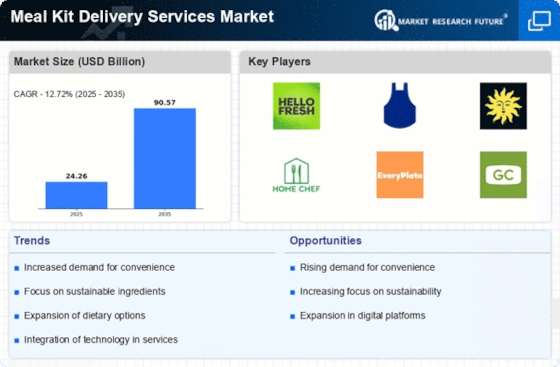Top Industry Leaders in the Meal Kit Delivery Services Market

Market share analysis in the meal kit delivery services segment is influenced by critical factors such as menu diversity, recipe quality, and the overall convenience of the service. Pricing strategies play a significant role, with companies offering meal kits at various price points to cater to diverse consumer segments. Establishing strong partnerships with suppliers for high-quality ingredients and collaborating with retailers for extended distribution are essential for market share, ensuring the availability and accessibility of meal kits to a wider consumer base.
While established players dominate the meal kit delivery services market, new and emerging companies are entering the space with innovative approaches. These entrants often focus on niche markets, unique dietary preferences, and special dietary needs to differentiate themselves. The agility of these emerging companies allows them to swiftly adapt to changing consumer preferences, challenging the market dominance of established brands and contributing to the overall diversity of the market.
Industry news within the meal kit delivery services market frequently highlights partnerships, acquisitions, and evolving consumer trends. Companies regularly introduce new recipes, dietary options, and collaborations with chefs or nutritionists to enhance the appeal of their meal kits. Acquisitions and mergers are common strategies, shaping the competitive landscape as companies seek to expand their market presence and acquire specialized capabilities. Evolving consumer preferences, such as the increased demand for plant-based options or the integration of technology for personalized meal planning, drive industry trends and influence companies to adapt their offerings accordingly.
Current trends in company investments within the meal kit delivery services market showcase a focus on technology integration, marketing, and sustainability. Companies allocate resources to enhance their online platforms, introduce mobile apps, and leverage data analytics for personalized recommendations. Strategic marketing initiatives, including digital advertising and partnerships with influencers, are employed to strengthen brand presence and resonate with the target consumer demographic. Investments in sustainable packaging and sourcing practices align with the growing consumer preference for eco-friendly and ethical meal kit options.
The overall competitive scenario in the meal kit delivery services market remains dynamic, with companies navigating evolving consumer lifestyles and preferences. Established players face the challenge of maintaining brand relevance in a market where emerging companies are capitalizing on specialized dietary trends and technological advancements. The competition is expected to intensify as new entrants gain recognition, introducing fresh recipes and challenging the market share of established brands. In this environment, adaptability, responsiveness to consumer trends, and a commitment to innovation will be crucial for companies to maintain and enhance their competitive positions in the meal kit delivery services market.
Industry News and Investment Landscape
- Recent purchases, such as Chef's Plate and Factor by HelloFresh, show market consolidation patterns.
- A focus on future innovation is seen in the rise in tech spending, AI-powered recipe recommendations, and smart kitchen collaborations.
- Meal planning apps and food subscription boxes are becoming more and more popular, which is driving the market's growth.
Key Companies in the Meal Kit Delivery Services Market Include
- Gousto (U.K.)
- Home Chef (US)
- PeachDish (US)
- Sun Basket (U.S.)
- ButcherBox (U.S.)
- Blue Apron LLC (U.S.)
- Purple Carrot (U.S.)
- Marley Spoon Inc. (Germany)
- HelloFresh (Germany)
- Plated (U.S.)











